
As the year 2000 approached, a reputation for academic excellence and international education at Beaver College had solidified, and the planning to become a university ramped up. Thanks to the size of its graduate program, the institution had been operating as a university for a number of years. Selecting a new name for the institution was a collective effort. Below is taken from A 150-Year History of Beaver College and Arcadia University (2003; Cameron, Curchack, Berger):
“The College began a process of inquiry and deliberation regarding the name, first by way of a large opinion survey of alumni, friends, students, faculty, and staff. Encouraged by the results to pursue a change, a faculty/staff/alumni/trustee/student committee met through the summer of 2000 to identify a potential new name for the institution, one that would capture its present and hoped-for future essence. Several potential names were tested in nationwide focus groups and reviewed by attorneys for trademark and related issues. The most popular name, and one which passed the legal and focus group tests, was suggested by Dr. Joan H. Thompson, associate professor of Political Science. In October 2000, the Trustees approved, and on November 20, it was publicly announced that Beaver College would become Arcadia University. The official change of name and status took place at a formal ceremony on July 16, 2001.”
Why We Changed Our Name
Criteria for the Name Change:
- A name that must reflect the University’s brand.
- A name that must live comfortably with and even more fully embody emotions and images that form the students’, faculty, staff and alum’s feelings toward the school.
- The name had to meet the supporting criteria of being clear, distinct, unique, and brief.
- A name open to most possibilities: Not overused or confused with other institutions or products. Distinctive: sounds like a university, but not every other university. Doesn’t niche the potential market either in terms of academic interest or financial accessibility.
- A name with easy marketability. Top of the alphabet for listings. Punchy and brief. Won’t be confused with other Universities in print or broadcast media.
- A name that doesn’t connote negative images in the prospect’s mind.
- A name that is not limiting in any important manner. No geographic, religious, or curriculum limitations. No conflicts or confusion with other institutions or commercial entities.
- A name that is appealing and intriguing on first exposure. Pleasant-sounding, easy to say and read. Little difficulties in spelling, pronunciation, and usage.
- A name that has the best possibility of being a strong trademark. Distinctive and not overused. Very small possibility of legal challenge.

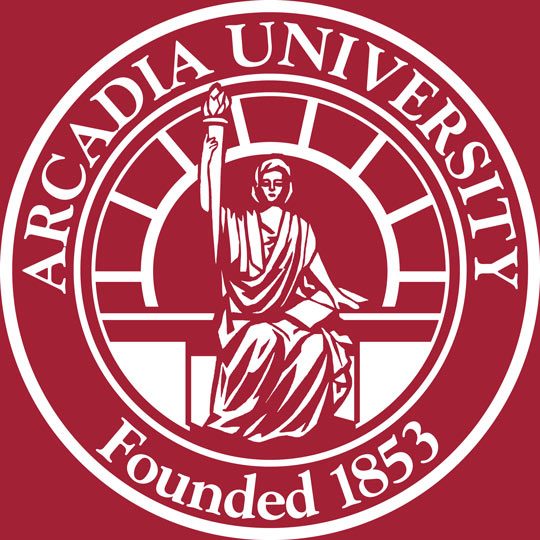
The process for Selecting a New Name for Our University
- The process involved a broad cross-section of the University Community. Alumni, trustees, faculty, staff and students were brought together to serve on the Name Finding Task Force. After months of work, their final recommendations were forwarded to the President and Board of Trustees.
- The process was guided by a specific set of requirements. We wanted a truly distinctive name that would not be confused with other schools or organizations. We wanted it to be intriguing, appealing, short and easy to say, read, and spell. Further, we asked that the Task Force develop a list of names that did not suggest academic, geographic or religious limitations. We also hoped it would be a name near the beginning of the alphabet and would be readily available to register on the Internet and with the Federal Patent and Trademark Office. Lastly, we had to assure it would be a name free from any negative or offensive connotation. It became apparent early on that meeting these criteria would not be an easy task.
- Why the name Arcadia University? Arcadia was a picturesque region of Ancient Greece known for its peacefulness and simplicity. It was a place where poets and philosophers felt nurtured and free to pursue independent thought and artistic inquiry. As a name, Arcadia has a strong and positive connection to academic pursuits, reflecting the university’s commitment to vigorous intellectual exploration, and a free exchange of knowledge and experience. It is also a name that underscores our mission as a leader in global education. Because of our focus on making a global perspective an inherent part of the academic experience here and our belief in study abroad as a critical part of every person’s educational experience, the name is a perfect fit for our university.
- The name has been well received by prospective students and their parents. During rigorous focus group research, conducted in major cities across the country to test several names, respondents selected Arcadia because of its historical significance. More importantly, they liked what Arcadia suggests about our school as a place that is intellectually stimulating and attentive to personal needs.
- The new name Arcadia University was announced and celebrated at an academic ceremony on July 16, 2001.



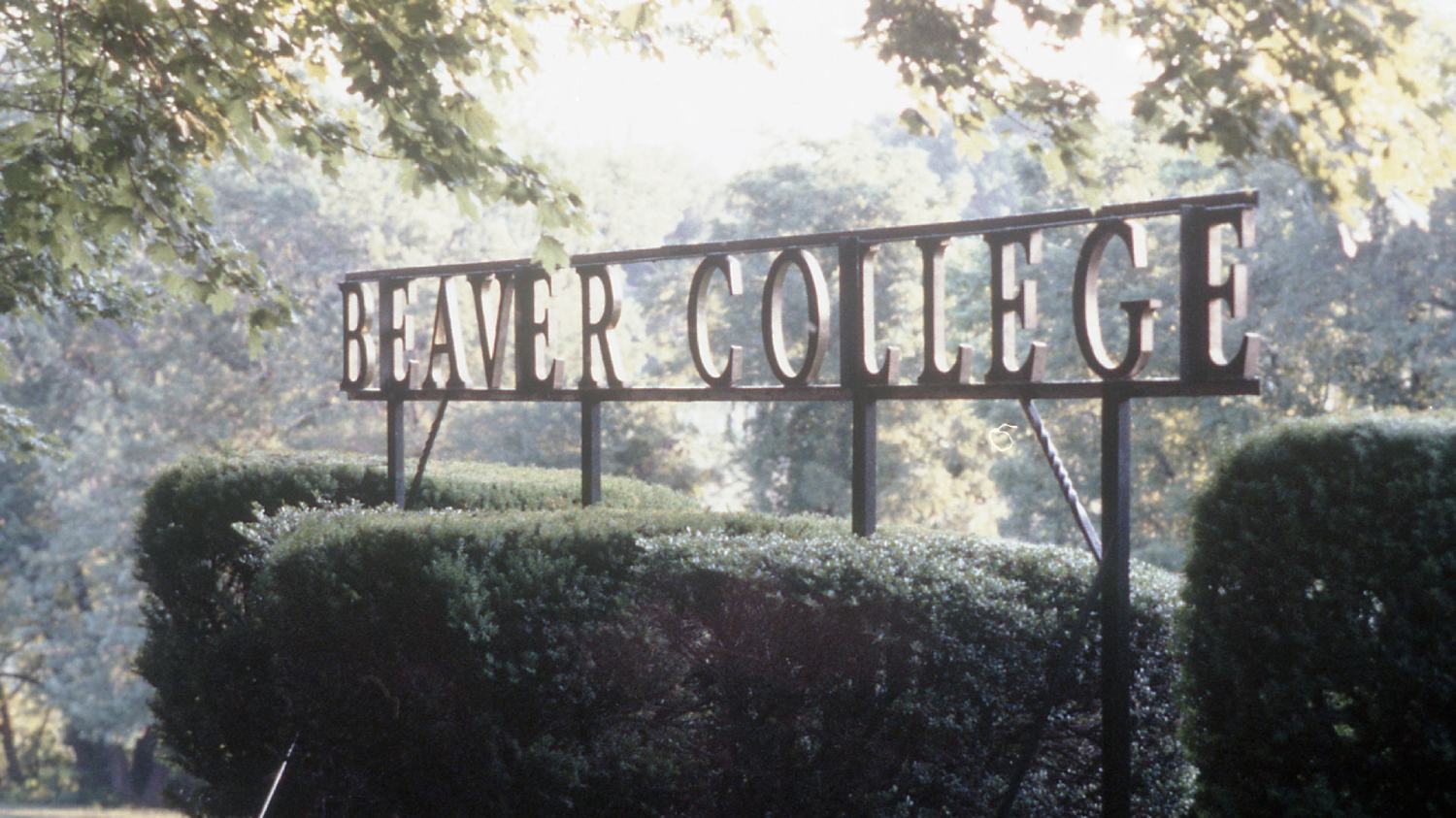
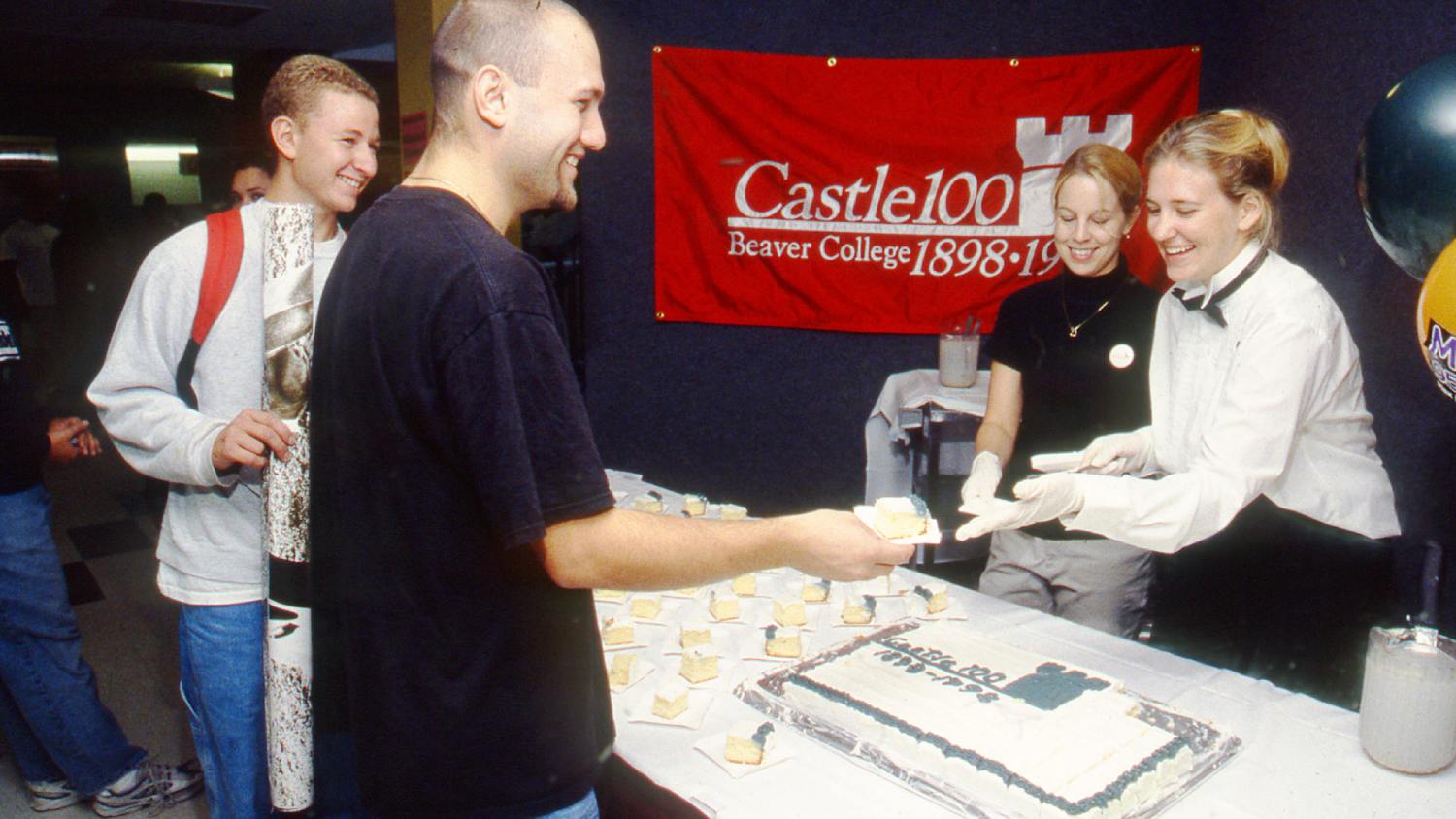
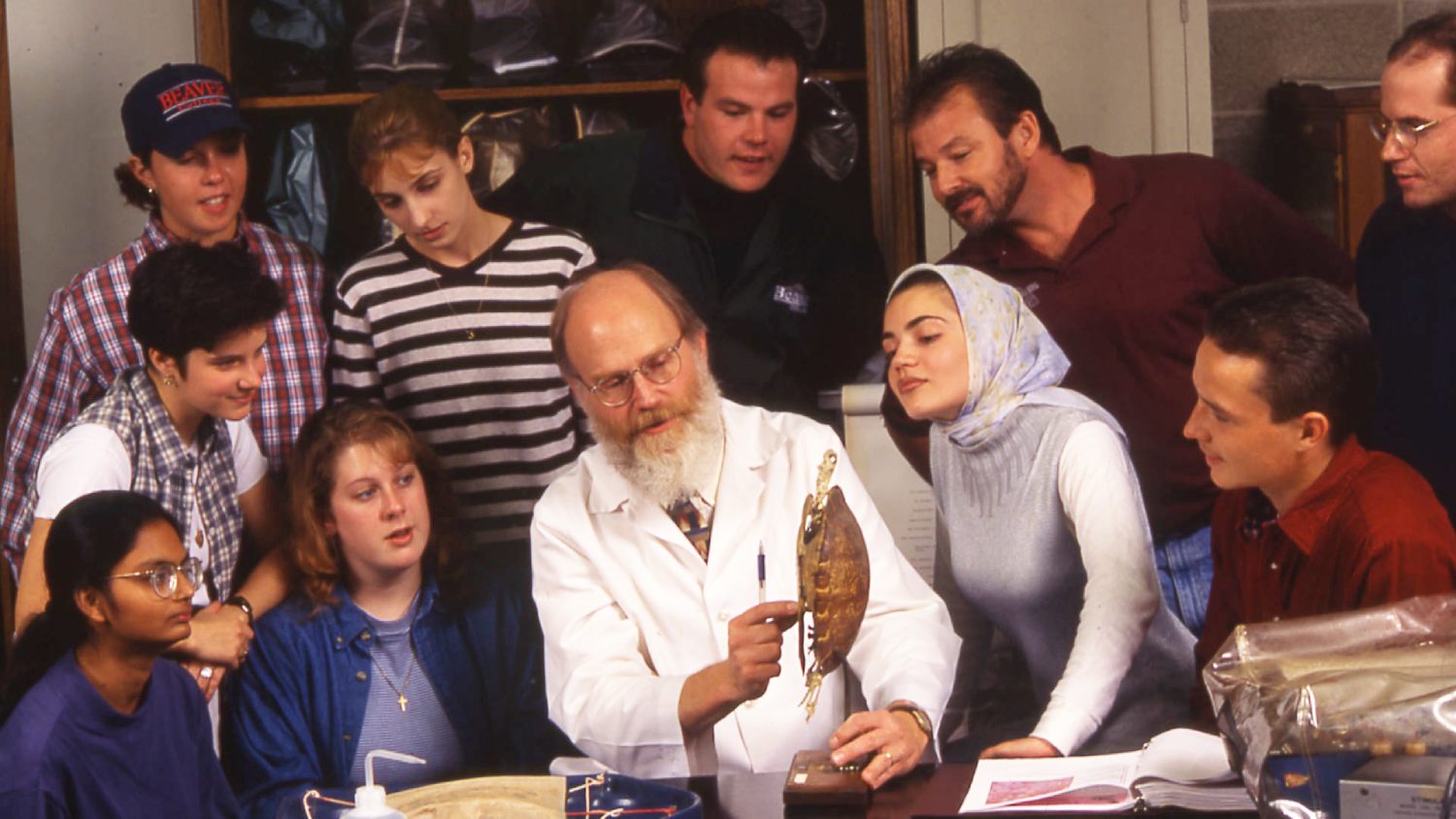
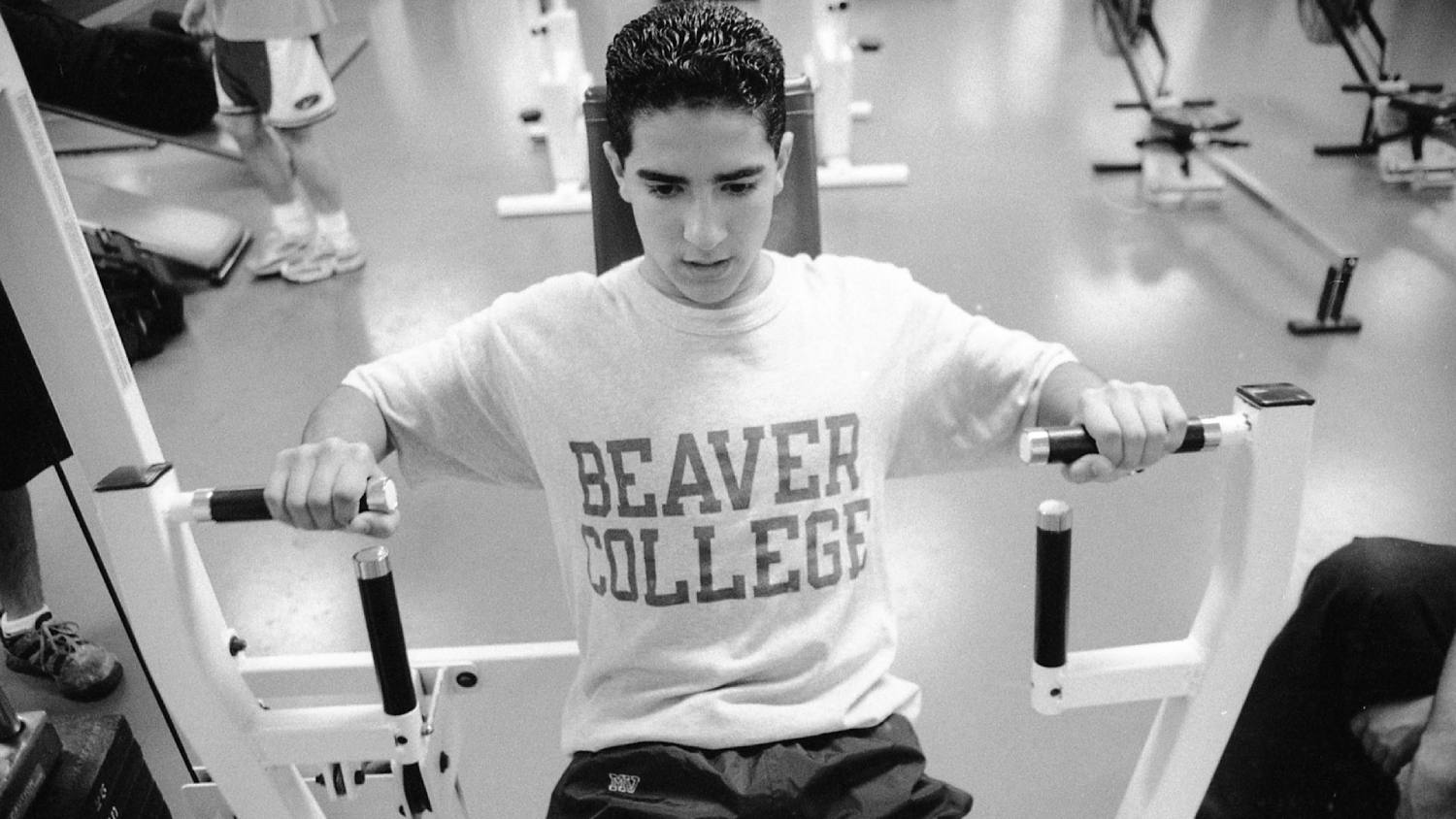









Circa 1964, Beaver College first-year students wearing beanies.
Coed Beaver College students crossing campus.
Beaver College students meet in an eating area in the 80s.
Vintage Beaver College sign.
Beaver College students celebrate the 100-year milestone with cake in 1998.
A hands-on biology class.
Keeping fit at Beaver College in the gym.
A vintage photo of Arcadia students working on a school banner reflecting the name change.
Circa 1964, Beaver College first-year students wearing beanies.
Coed Beaver College students crossing campus.
Beaver College students meet in an eating area in the 80s.
Vintage Beaver College sign.
Beaver College students celebrate the 100-year milestone with cake in 1998.
A hands-on biology class.
Keeping fit at Beaver College in the gym.
A vintage photo of Arcadia students working on a school banner reflecting the name change.
Frequently Asked Questions
Why did the University undertake this name and status change?
The time had come for this institution to have a name that emphasized the achievements of its students, alumni, faculty, staff and programs. This school is a far different place than it was at the time of its founding in 1853 as a small women's college in Western Pennsylvania's Beaver County. We were known for our nationally ranked programs and nationally recognized faculty, and we are a recognized leader in international education. We are also ranked in the top 20 regional universities in the North by U.S. News and World Report. All of these elements made it clear that a new name was needed to describe what is, in many ways, a new institution.
Why was Arcadia University chosen as the new name?
Arcadia was a picturesque region in ancient Greece, a birthplace of modern thought and learning where philosophers pursued independent thought and inquiry. This is the role that Arcadia University aspires to play in the lives of its students by offering a distinguished tradition of academic excellence, an emphasis on problem solving and critical thinking and a strong global perspective. See The Process for Selecting a Name for Our New University.
How was the name Arcadia University selected?
A unanimous vote by the University's Board of Trustees in June of 2000 to change both the name and status concluded a 10-month investigative process -- possibly the most extensive conducted by any institution of higher learning that has changed its name.
All University constituencies -- more than 20,000 alumni, students, parents, faculty, staff and friends -- were asked to voice their opinions through surveys and campus meetings. The University continued its thorough research by conducting focus groups in major U.S. cities. Participants in every city consistently agreed that the name Arcadia fits our institution.
Why did the College seek university status?
The term "college" generally refers to schools with none or few graduate programs. At Arcadia, nearly half the institution's students are enrolled in graduate programs, including the nationally top-ranked doctorate in physical therapy. Because of this, the Carnegie Foundation had classified the institution for several years as a university for the Advancement of Teaching.
After the Board of Trustees voted in June 2000 to pursue university status, the College was required to submit an extensive report to the State Department of Education, detailing the institution's academic programs. A state-appointed team of evaluators reviewed our application and visited the campus in September of the same year to interview key administrators. Our application was then placed in a State bulletin for 30 days so others could have an opportunity to contest our request. At the end of the 30-day period, the Secretary of Education approved our request to rename the institution Arcadia University.
When did this change officially go into effect?
The official change to Arcadia University took place on Monday, July 16, 2001. On that day, the institution officially changed its charter and begin operating as Arcadia University.
Did students who graduated in 2001 receive a Beaver College or Arcadia University diploma?
Students who graduated in May 2001 were the final class to graduate from Beaver College. Beaver College alumni have been offered a new Arcadia University diploma although their original diploma will always be valid.

